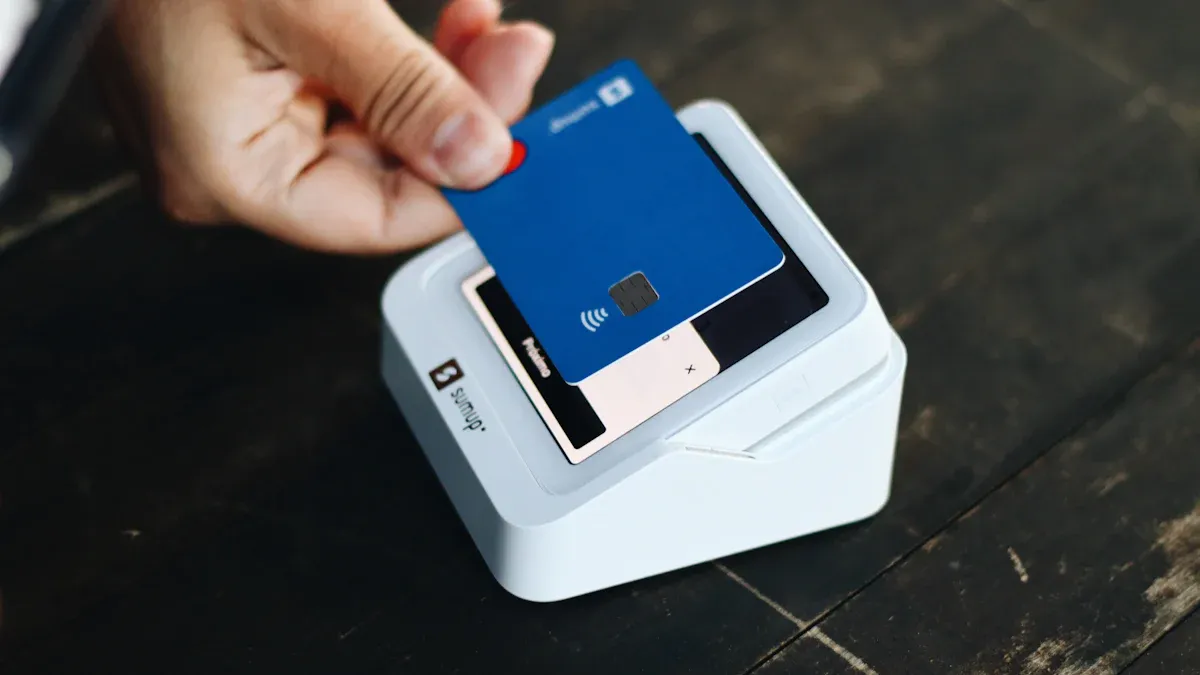- EasyCard
- Trade
- Help
- Announcement
- Academy
- SWIFT Code
- Iban Number
- Referral
- Customer Service
- Blog
- Creator
Alipay International Credit Card: Binding Tutorial and Fee Guide

Image Source: unsplash
You can directly bind mainstream credit card brands like Visa, MasterCard, JCB, and American Express in Alipay’s international credit card function. For each transaction, the system charges a 3% transaction fee, waived for single payments not exceeding USD 28 (calculated based on real-time exchange rates). You need to complete real-name authentication and ensure you switch to the international checkout version. If you use a virtual card, you must also confirm that the card information is valid and accurate.
Key Points
- Alipay supports binding mainstream international credit cards like Visa, MasterCard, JCB, and American Express, requiring real-name authentication and switching to the international checkout version.
- When binding, ensure the credit card supports international payments, enter accurate and valid card information and billing address to avoid binding failures due to incorrect details.
- A 3% transaction fee is charged for each international credit card payment, waived for single transactions not exceeding USD 28, making it suitable for daily small-amount spending.
- Payments may face risk control audits and currency conversion; it’s recommended to understand the issuing bank’s policies in advance and contact Alipay or bank customer service promptly if issues arise.
- The binding process is simple, supporting both virtual and physical cards, with some card types offering red packet rewards for first-time binding; verify information carefully to ensure smooth payments.
Supported Card Types and Binding Conditions
Supported International Credit Cards
You can bind various mainstream international credit cards in Alipay’s international credit card function. Commonly supported card types include:
- Visa
- MasterCard
- JCB
- American Express
These cards can be issued by banks in different countries and regions. For example, you can use a Visa or MasterCard credit card issued by a Hong Kong bank for binding. You need to ensure your credit card is an international card; some virtual cards can also be bound, but their information must be valid and accurate.
Note: Some banks’ virtual credit cards may fail to bind. You should confirm the card supports international online payment functions before binding.
Binding Conditions
When binding an international credit card to Alipay, you need to meet the following conditions:
- You must complete real-name authentication. Alipay requires you to upload valid identification documents and verify your identity through methods like facial recognition.
- You need to switch to the international checkout version. The specific steps are as follows:
- Open the Alipay app and go to the international checkout page.
- In the top left corner, select the appropriate regional version (e.g., Hong Kong, Taiwan, or other overseas versions).
- Choose “International Credit Card” as the payment method.
- Enter your international credit card information.
- Click “Next” and fill in payment information.
- If your issuing bank has enabled 3D Secure, the system will prompt you to enter a 3D verification code.
- The credit card you bind must support international payments. Some credit cards restricted to domestic use in China cannot be bound.
- You need to ensure the credit card is not expired and is in normal status.
During the binding process, if you encounter issues, you can first check if the card information was entered correctly or contact the issuing bank (e.g., a Hong Kong bank) to confirm if the card supports international payments.
Alipay International Credit Card Binding Process

Image Source: pexels
Binding Steps
You can follow these steps to bind an international credit card in the Alipay app:
- Open the Alipay app and click “My” in the bottom right corner.
- Go to the “Bank Cards” page and click the “+” icon in the top right corner.
- Enter your credit card number. You can bind Visa, MasterCard, JCB, or American Express international credit cards. For example, with a Visa credit card issued by a Hong Kong bank, you need to ensure the card has enabled international payment functions.
- Follow the prompts to enter the credit card’s expiration date, CVV code, and other information.
- Submit relevant identification information to complete real-name authentication. You need to upload valid ID documents and verify your identity through methods like facial recognition.
- If you are a non-mainland China user, it’s recommended to switch to the international checkout version first. After entering the international checkout, select the appropriate region (e.g., Hong Kong, Taiwan, or other overseas versions), then choose “International Credit Card” as the payment method.
- Fill in payment information and click “Confirm Payment.” If the issuing bank supports 3D Secure, the system will prompt you to enter a 3D verification code.
- After successful binding, you can use the credit card for payments. Each transaction will be settled in USD based on real-time exchange rates.
Tip: Virtual credit cards like Depay can also be bound, with a process similar to physical cards. You need to enter the card number, expiration date, and CVV code. The billing address should ideally be a valid address in China. If you encounter risk control issues, you can upload a screenshot of the Depay app homepage for appeal.
The binding process for American Express credit cards is relatively simplified. You only need to enter the card number, expiration date, and CVV code, and the system will automatically recognize the card type and complete subsequent verification. Some American Express cards support 3D Secure exemption, making binding faster.
If you bind certain international credit cards, such as those from Agricultural Bank of China (e.g., Amex RMB card, Mastercard Global Payment Platinum Card) for the first time between March 1, 2025, and June 30, 2025, you can receive Alipay consumption red packets and benefit packages. Red packets are automatically issued, redeemable for Alipay transactions exceeding USD 0.70 (based on real-time exchange rates), valid for 5 days.
Common Issues
When binding an international credit card to Alipay, you may encounter the following common issues:
- The credit card has not enabled foreign currency or cross-border payment functions. You need to contact the issuing bank, such as a Hong Kong bank, to confirm the card supports international payments.
- Inconsistent billing address. It’s recommended to keep the billing address consistent with the credit card information, preferably using a U.S. or Hong Kong address.
- Incorrect country or region selection. You need to select the correct regional version in the international checkout, or binding may fail.
- Credit card risk control restrictions. Some banks have special risk control requirements for Chinese payment platforms, which may require additional documents or a different credit card.
- Virtual credit card binding failure. You can try uploading a screenshot of the Depay app homepage to lift risk control restrictions.
- Multiple binding failures. It’s recommended to try a different international credit card or contact the issuing bank’s customer service for assistance.
Note: Some international credit or debit cards issued by certain banks may require pre-activation for use in China. You should contact the issuing bank in advance to confirm cross-border payment support. Although Alipay’s international credit card function supports multiple card types, some banks and card types have restrictions.
If you encounter unsolvable issues, you can submit feedback through the customer service center in the Alipay app or call Alipay’s official customer service hotline for assistance.
Transaction Fee Policy

Image Source: pexels
Fee Structure
When using an international credit card for payments on Alipay, the system charges a transaction fee. For each online transaction, Alipay charges a 3% fee based on the transaction amount. For example, if you pay USD 100 with an international credit card, the system will charge an additional USD 3 as a transaction fee. During payment, the system will display the fee amount, and you can see the total cost clearly on the confirmation page.
Currently, offline QR code payments are exempt from transaction fees. When you use an international credit card for QR code payments at certain offline merchants in China, the system will not charge additional fees. You can confidently use this function for daily spending.
Tip: The transaction fee policy may be adjusted based on Alipay’s latest announcements. Before making large payments, it’s recommended to check the latest information in the app.
Fee-Free Threshold
Alipay’s international credit card function offers a fee-free policy for small transactions. For each payment not exceeding USD 28, the system waives the transaction fee. You can take full advantage of this policy for daily small-amount spending. For example, if you buy a coffee in China for USD 5, the system will not charge a transaction fee.
You need to note that the fee-free threshold applies to single transaction amounts. If you make multiple small payments, each not exceeding USD 28, no fees will be charged. If a single payment exceeds USD 28, the system will charge a 3% fee on the excess amount.
| Payment Amount (USD) | Transaction Fee Policy |
|---|---|
| ≤ 28 | No transaction fee |
| > 28 | 3% transaction fee |
Other Fees
When using an international credit card on Alipay, you may encounter additional fees beyond the transaction fee. When paying with a non-USD credit card, the system automatically converts the transaction amount to USD based on real-time exchange rates. Your issuing bank may charge a foreign currency conversion fee. Please consult your bank for specific rates.
If you use Alipay’s international version for credit card repayments, some banks may charge repayment fees. Before repaying, it’s recommended to check the issuing bank’s policies.
Note: Foreign currency conversion and repayment fees vary by bank. Before large payments or repayments, consult your bank’s customer service to avoid unnecessary costs.
Usage Precautions
Amount and Card Type Restrictions
When using an international credit card for payments, you need to be aware of amount restrictions. Single transaction amounts typically have an upper limit, depending on your credit card type and issuing bank policies. For example, some Visa or MasterCard credit cards issued by Hong Kong banks may have a single transaction limit of USD 5,000. Before large payments, it’s recommended to consult the issuing bank to confirm the limit. You also need to note card type restrictions. Some virtual credit cards, although bindable, may fail payments due to risk control measures. When binding virtual cards, prioritize those supporting international online payments. American Express and JCB cards may not be supported by some Chinese merchants in certain scenarios. You can check Alipay’s in-app supported card list to confirm your card’s applicability.
Risk Control and Exchange Rates
During payments, you may encounter risk control audits. The system evaluates risk based on your payment behavior, card information, and region. Frequent device changes, region switches, or multiple payments in a short time may trigger risk control, leading to payment failure. You can lift restrictions by uploading identity proof or contacting the issuing bank. Exchange rate conversion is another factor to consider. When paying with a non-USD credit card, the system converts RMB amounts to USD based on real-time rates. Your Hong Kong bank may charge an additional foreign currency conversion fee. Before paying, you can review the exchange rate and fee details on the confirmation page to avoid unexpected costs due to rate fluctuations.
Tip: For large payments or frequent transactions, communicate with the issuing bank in advance to understand risk control policies and exchange rate rules.
Customer Service and Feedback
If you encounter issues during use, you can seek help through the following methods:
- Open the Alipay app, go to “My” - “Customer Service Center,” and submit your issue online.
- Call Alipay’s official customer service hotline for live assistance.
- If the issue involves credit card binding or payment failures, it’s recommended to also contact the Hong Kong bank’s customer service to confirm card status and payment permissions.
When providing feedback, prepare relevant screenshots, payment records, and card information to help customer service identify the issue quickly. You can also check common FAQs in the Alipay app for self-service solutions.
You now understand the binding process and supported card types for Alipay’s international credit card function. You can bind Visa, MasterCard, JCB, and American Express credit cards. Be mindful of the 3% transaction fee, waived for single transactions under USD 28. You need to complete real-name authentication and stay aware of risk control audits and exchange rate changes. For issues, contact Alipay customer service promptly.
Recommendation: Choose the appropriate payment method based on your needs, ensure accurate information entry, and avoid payment failures.
FAQ
What documents are needed to bind an international credit card?
You need to prepare the credit card number, expiration date, CVV code, and billing address. You also need to complete real-name authentication by uploading valid identification documents. All information must be valid and accurate.
Why does the system prompt “Card not supported” during binding?
The credit card you’re binding may not have enabled international payment functions. Contact the issuing bank to confirm support for international online payments. Some virtual cards may also be unsupported.
Why is a 3% transaction fee charged for payments?
When using an international credit card on Alipay, the system automatically charges a 3% transaction fee. Single transactions not exceeding USD 28 are exempt from the fee.
What should I do if a payment fails after binding?
Check if the credit card information is correct. Contact the issuing bank to confirm the card’s status. For risk control issues, submit relevant proof documents.
How can I view real-time exchange rates and transaction fees?
You can view real-time exchange rates and fee details on the payment confirmation page. Check the amounts carefully before confirming to avoid unexpected costs due to rate fluctuations.
You have gained a comprehensive understanding of the Alipay international credit card binding tutorial and fee policy. This guide provides a detailed look at how to bind major international credit cards, handle risk control issues during payments, and understand the fee structure for different transaction amounts. You can now use Alipay more confidently for your cross-border spending.
However, despite the convenience of Alipay’s international credit card payment service, you might still encounter certain limitations and pain points in some scenarios. For example, the 3% transaction fee can be a significant cost for large transactions, while the $28 single-transaction fee-free limit is often insufficient for many cross-border shopping and subscription services. Furthermore, if you don’t have a USD-denominated credit card, you’ll also incur additional foreign currency exchange fees from your issuing bank, which further increases your payment costs.
To solve these pain points, you can choose a more efficient and economical global financial service platform—BiyaPay. BiyaPay offers remittance fees as low as 0.5% and supports same-day transfers, allowing you to handle large fund transfers at a much lower cost. On the BiyaPay platform, you can flexibly exchange between USD, HKD, and cryptocurrencies, and use these funds directly for international payments. Its real-time exchange rate lookup feature allows you to always get the best exchange rates, avoiding unnecessary losses. Register now and start your new global financial journey, making every cross-border payment more effortless and cost-effective.
*This article is provided for general information purposes and does not constitute legal, tax or other professional advice from BiyaPay or its subsidiaries and its affiliates, and it is not intended as a substitute for obtaining advice from a financial advisor or any other professional.
We make no representations, warranties or warranties, express or implied, as to the accuracy, completeness or timeliness of the contents of this publication.




Contact Us
Company and Team
BiyaPay Products
Customer Services
is a broker-dealer registered with the U.S. Securities and Exchange Commission (SEC) (No.: 802-127417), member of the Financial Industry Regulatory Authority (FINRA) (CRD: 325027), member of the Securities Investor Protection Corporation (SIPC), and regulated by FINRA and SEC.
registered with the US Financial Crimes Enforcement Network (FinCEN), as a Money Services Business (MSB), registration number: 31000218637349, and regulated by FinCEN.
registered as Financial Service Provider (FSP number: FSP1007221) in New Zealand, and is a member of the Financial Dispute Resolution Scheme, a New Zealand independent dispute resolution service provider.




















